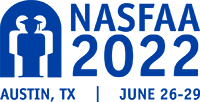A Conversation With Department of Education Under Secretary James Kvaal
By Hugh T. Ferguson, NASFAA Senior Staff Reporter
The Department of Education's (ED) top higher education official — Under Secretary James Kvaal — sat down with NASFAA President & CEO Justin Draeger for a wide-ranging interview on the agency's higher education priorities, touching on many of the most pressing issues facing the financial aid community.
The discussion, held Monday during the 2022 NASFAA National Conference in Austin, dove into the efforts to ensure increased affordability and improved outcomes for students who enroll in higher education, as well as other hot topics, such as the potential for student loan forgiveness and doubling the maximum Pell Grant.
On the issue of loan forgiveness, Kvaal largely reiterated previous remarks — that officials are continuing to analyze the issue, but in the meantime are working to ensure that all borrowers who are currently eligible for forgiveness receive the benefits they're entitled to.
With ongoing discussions over whether President Joe Biden has the authority to unilaterally cancel student debt, Kvaal said he did not want to get into detail of legal analysis. While the debate continues to run Kvaal reiterated that right now the expectation is for repayment to resume after August 31, but that it is something the administration is continuing to consider.
Kvaal referred to the financial aid profession as an idealistic group that is working toward shared goals with the department.
In this partnership, Kvaal urged the community to raise awareness about the limited waiver for the Public Service Loan Forgiveness (PSLF) program and committed that ED was working to make continued improvements.
"We need to work towards making this process as automatic and as smooth as possible for borrowers," Kvaal said.
On Biden's budget proposal, Kvaal remained optimistic that Congress would see the benefits of the proposed spending increases for the department and for federal student aid programs.
Kvaal also said that ED was working to fundamentally reform financing of higher education, adding that policymakers cannot ignore the significant number of borrowers who have struggled to repay their loans.
On the regulatory agenda, Kvaal said that ED was heavily involved in the process and was taking a thorough approach to the new regulations, especially the issue of gainful employment.
"We do take public comment very seriously," Kvaal said, encouraging financial aid professionals to participate in the ongoing negotiated rulemaking process.
Kvaal also expressed an eagerness to work with the financial aid community to make sure the regulatory framework is implemented in a manageable way.
Draeger sought more insight from ED on the delay in the verification waivers for 2022-23 and said that it was important for the financial aid community to be looped into the policymaking process even if the department needs additional time to work through the implementation phase of a given policy.
"We don't want perfect to be the enemy of the good," Draeger said. "Even if we don't have all the answers, some answers help us make plans on campus."
The conversation also turned to talks about the potential of short-term Pell with Kvaal indicating that ED would want additional data and more conversations to take place on the varying proposals Congress has drafted.
"We should have a careful consideration whether these programs should be considered for Pell as well," Kvaal said of programs that were not eligible for credits.
For Kvaal, investment in the Pell Grant is a top priority.
"I think double Pell would be a really great start," Kvaal said, answering what his ideal amount for annual Pell would be, adding that it would be apparent that funding for the grant had reached an appropriate amount when there were no longer disparities in college-going.
As the administration continues to carry out the litany of policies related to the higher education agenda, Kvaal pledged to NASFAA members that the conversation would continue with full engagement with the financial aid community.
"The arc of student aid policy is long, Justin," Kvaal said. "But it bends towards NASFAA."
Publication Date: 6/27/2022

You must be logged in to comment on this page.